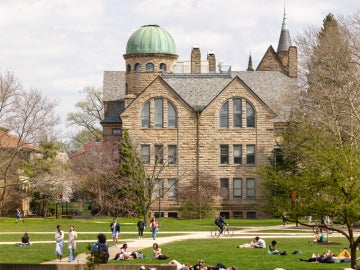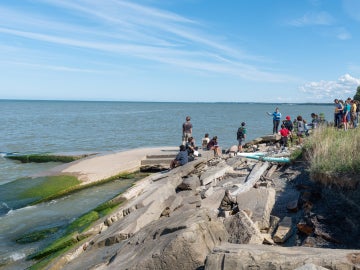Q&A with Ann Cooper Albright
November 9, 2018
Phoebe Pan ’20

Ann Cooper Albright dances with students.
Photo credit: John Seyfried
Professor of Dance Ann Cooper Albright recently gave a talk at Rutgers University as a part of its annual Dance and Philosophy Lecture series. She also has a new book forthcoming from Oxford University Press, titled How to Land: Finding Ground in an Unstable World.
Q: Could you give a brief explanation of how this book came to be, and what it covers or seeks to address?
This is a book that I’ve been working on and thinking about for the last eight years. I would say that it was precipitated by a lot of my experiences teaching students at Oberlin, as well as teaching workshops professionally. I had developed a series of exercises that were about trying to help people ground themselves in their lives. In some ways, I was teaching a set of skills, but underneath the skills, the real question was: how can you be present in the world with your body? How we move in the world affects the way we think about the world. I started to notice this rise of anxiety, of distractedness, of students having a hard time focusing and feeling present.
In a way, the book is a meeting of somatics and politics. I began with 9/11 and the images of falling bodies, and the sense that, throughout much of the 21st century, we’ve been involved in witnessing things falling apart: governments, economic disasters, mass shootings. There’s a sense of fear that we have in our bodies. Part of that is the fear of falling, and the other part is this increased use of screens, which keeps people in a symbolic, visual, two-dimensional mind frame where you don’t feel the world around you.
Q: Much of your research and scholarship explores the intersection of dance, cultural theory, and philosophy. What inspired you to bring these topics in conversation with one another?
I majored in philosophy and French literature, and I went to college thinking that I was going to be a civil rights lawyer. Then, during my first year, I thought I’d take something besides an academic class, just to mix things up. So I took a dance composition class, and from there, I entered dance from a holistic perspective, in that I was involved with it not just as a physical technique but as a whole realm. At a certain point, though, I felt that there wasn’t enough discussion about how dance makes meaning, and how we can think about dance as cultural representation as well as physical practice. I’ve always been as interested in the place of bodies in culture as I am in dance as an art form. I never wanted to think about dance only within its own isolated framework.
Q: What are ways in which people can understand the dance major as more than just a “hobby,” and more as a lifelong, sustained practice?
In the dance department, when you take an academic class, dance is the discipline. You’re committing yourself to seeing that dance is as important a lens to view the world as history or psychology. My entire career has been spent proving to academia that dance is a fertile field in which we can think about the world. If you can try to understand a culture through its art, then you can try to understand it through their dance. What I insist on is, in order to do that, you have to be prepared to use your body as an instrument of learning as well.
Q: What do you find unique about teaching at Oberlin? Any favorite moments?
First of all—this space, Warner Main, is the living embodiment and spirit of contact form—this space is beautiful. But also, I feel that students at Oberlin are both smart and willing to be serious about their studies in dance. There are some colleges where students continue to think about dance as a hobby, and that wouldn’t be as satisfying to me. At the same time, though, I wouldn’t want to teach at a place where people aren’t majoring in other departments and bringing that information into their dance practice.
Some of my favorite moments are when we invite other people to class, and there are 80-something people up in Warner in a round-robin circle, entering the dance. When we open up the dance community to a larger community, you feel how powerful it is to have so many people in that space.
You may also like…
Oberlin Launches Critical AI Studies Minor in Fall 2026
With a solid foundation in both science and the humanities, this minor ensures students to understand and be able to analyze the ethical, cultural, environmental, political, economic, technological, and labor effects of AI.
Research Roundup
Every day, Oberlin’s faculty and students produce scholarly work that uncovers new insights into how we understand the world, particularly in the areas of sustainability and the environment.
Longman Professor Emeritus of English and Creative Writing David Young Dies at 88
Longman Professor Emeritus of English and Creative Writing David Young died on Saturday, May 3. He was 88. An esteemed poet, translator, editor, and scholar, Young taught at Oberlin between 1961 and...


